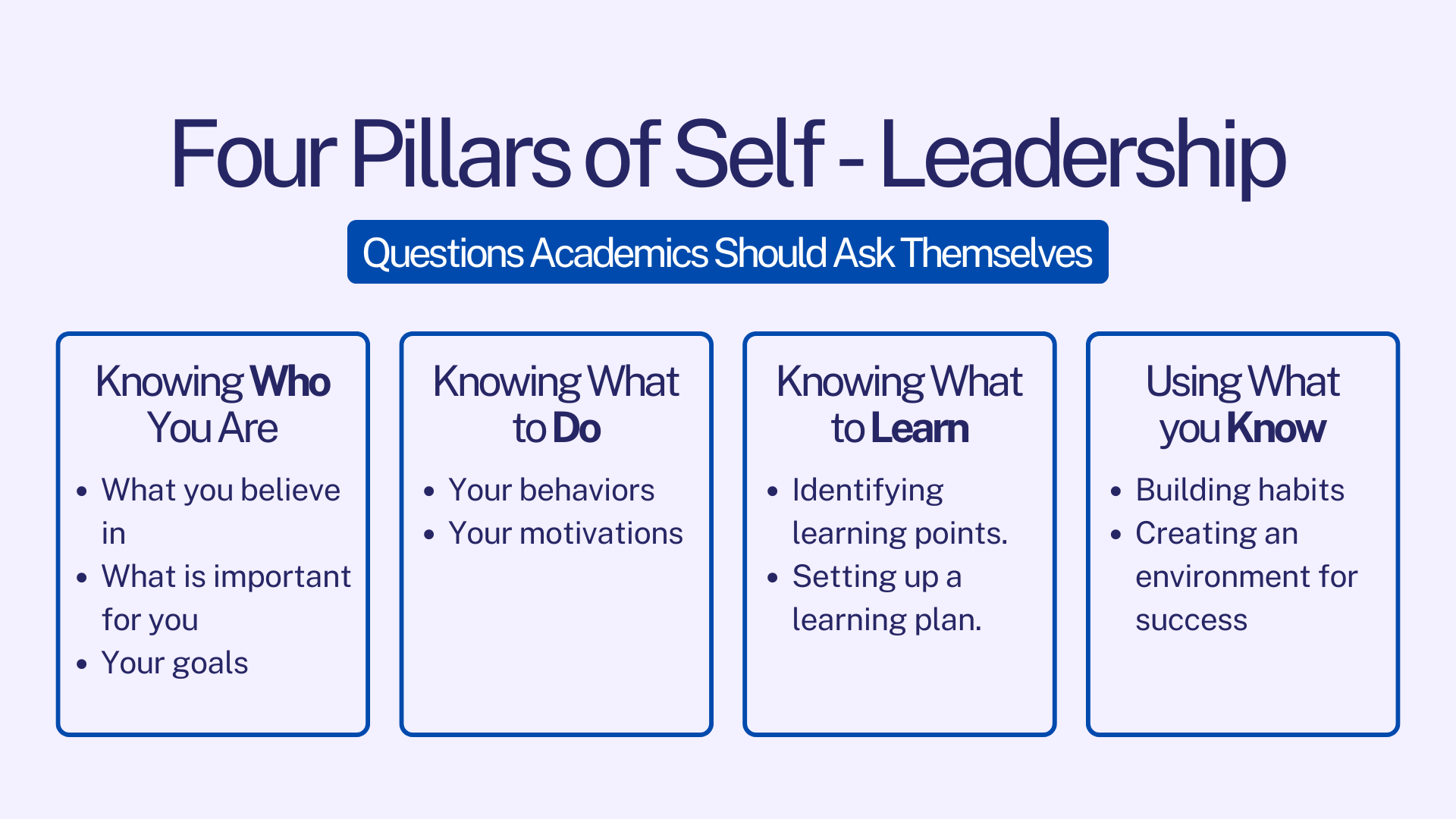Why academics need to be able to lead themselves
TL;DR. The initial weeks were overwhelming. I felt the pressure of needing to have all the answers for my students. However, everything changed after hearing Professor Dr. Astuty Binti Amrin’s talk on Self-Leadership. She emphasized the importance of constantly asking oneself the Four Pillars of Self-Leadership questions. This concept resonated with me deeply, helping me understand my purpose. Now, I strive to be always eager to learn and adapt, ensuring my students gain valuable knowledge and personal growth from my classes.
My Story
I made it!!!!! After five years of struggling with my PhD betting that I would get a position as a lecturer, I reported for duty as a Senior Lecturer at the Faculty of Computing, UTM on November 20, 2023.
The first few weeks were overwhelming when thinking about the responsibilities that will be bestowed upon me and the students that will be looking up to me for guidance. Almost to the point that I regretted pursuing the career that I worked hard for. But I keep telling myself to keep a brave face and always look like I know everything on top of my head, when in reality a lot of time I have no answer my students were looking for.
I figure that I am no longer the one who should be asking. Instead I am the one that should have the answers as I am the leader to my students.
That all changed when I heard a talk by Professor Dr. Astuty Binti Amrin (referred to Prof. Astuty herein) who presented the concept of Self-Leadership that emphasizes that academics should always ask themselves these few questions, known as the Four Pillars of Self Leadership. Now, I realise that I am not only the leader of my students but also of myself.

Self-Leadership and the Moon Rocket?
But why is it so necessary that Prof. Astuty spends nearly two hours emphasizing that academics constantly ask themselves these questions? I will tell the story of how the Saturn V moon rocket was designed and built to summarize what Prof. Astuty talked about in a few paragraphs.

The Saturn V rocket is designed to do only one thing. In a sense, before the first blueprint was drawn, the rocket engineers should already know what kind of rocket it is (knowing who you are) and knowing the purpose of the rocket (knowing what to do). And the answers to both of these questions respectively are, it is a moon rocket whose sole purpose is to only go to the moon. Knowing the answers to these questions aligns all the NASA rocket scientists to a singular purpose of designing a rocket that will only go to the moon and not to the Sun or anywhere else.
Obviously, designing a moon rocket is a non-trivial task. Therefore, the NASA rocket scientists need to figure out what are the engineering challenges that will come about when building a moon rocket. This will become the what you need to learn part of the four pillars of self-leadership. To answer this part of the question, it will then need to capitalize the expertise that they have in order to be able to tackle the engineering challenges that lies ahead. And yes, this is the using what you know part of the self-identification question.
As you can see, the four pillars of self-leadership can become a potent thinking framework even when it comes to building a rocket that could send humans to the moon. Without answering those questions, President John F. Kennedy’s aspiration to send Americans to the surface of the moon before the end of the 1970s will not be realized.
The same thing with academics. Without keep asking themselves these questions and having the answers to all of them, an academic will never know his purpose. Just like not knowing what kind of rocket to design and its ultimate destination. Consequently, the academic will also not be able to tell what are the steps he need to learn to achieve his goal, or lack thereof. Much like the rocket scientists not knowing the challenges and how to solve them with their expertise.
My Answer to the Self-Leadership Questions.
So now, what are my answers to the four pillars of leadership?
What am I (Knowing Who You Are)?
I am Senior Lecturer who believe that my raison d’être is to give an unquestionable dedication to my students and to make sure that all student that I came across will learn something new from me, whether in academics or their personal development. I am also an expert in my field of Cyber Security and Data Science.
What I Will Do (Knowing What to Do)?
To ensure that I will remain dedicated to my students, I will ensure that I will always remain approachable to my students and will not discriminate against them regardless of their race, religion or even their abilities. Everyone will get my undivided attention as long as they show a willingness to learn. And to remain an expert in my field, I will constantly improve my skills and learn new things related to my expertise.
What do I need to Learn?
To remain effective both as a lecturer, I will constantly seek advice from my seniors on how to effectively deliver my lesson plans and take comments from my students as feedback rather than criticisms. Most importantly, I need to learn what will make current generation students tick and what motivates them to do better. Capitalizing on this information will ensure that my class will remain engaging and increase my student’s interest in my subject beyond simply a graduation requirement.
As I have always been told by my PhD supervisor, I must never be complacent with my knowledge to remain effective as a researcher. My current knowledge might become outdated anytime someone much smarter than me publishes a groundbreaking work that contradicts it, making my knowledge immediately irrelevant. Therefore, learning is constant.
My knowledge should also cross several domains to ensure breadth. In fact, this is what I have been doing. I have a laser focus on my main domain, which is Cyber Security, but I am still competent in Machine Learning and Artificial Intelligence.
Using What I Know.
To find the answers to the What do I need to Learn questions, I need to take advantage of what I already know, especially with regard to teaching. As I am a fairly young lecturer – by my own admission -, I resonate with this generation better than my more senior faculty members. I know that current students tend to perform better if you give them a long leash to allow them to explore and make their own mistakes. Current students also tend to perform better if they know that you trust them to complete a certain task rather than hand-holding them.
Also, to be at the top of my expertise, I need to use and sharpen the most basic theories and techniques in my domain, as those are the building blocks of future knowledge and are unlikely to change.
Parting Note
As I write this post, I realize that my job as an academic is far different from other professions. A police officer or a soldier always has someone from the higher up telling them what they need to do. A computer programmer always has someone telling them what system to build or what feature to add or remove. Basically, they all know the reason for their existence, and what they need to do. Self-leadership is not essential in their daily profession as long as they can execute their orders perfectly.
But an academic has none of that luxury. An academic needs to figure out on their own what their expertise is, what kind of lecturer they want to be, e.g., research, teaching or industry oriented, and they need to figure out on their own how to stand out from the rest to maximize their career potential. Every top lecturer that I met has a different story of how they got there. Therefore, the four pillars of self-leadership help in shining the light on every academician who wants to have a clear sight of what they want to achieve.
-Dr. Zafran

Muhammad Zafran
A lecturer, researcher, consultant and most importantly a son.

